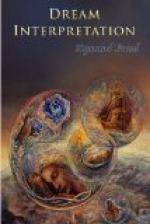
|
Chapter 1 (pp. 5-7)
1. How does Freud say that dreams were regarded by pre-scientific people upon wakening in terms of manifestation of higher powers?
(a) As worthless.
(b) As friendly or hostile.
(c) As instructional for the future.
(d) As informative.
2. With the rise of scientific thought, expressive mythology was transferred to _____.
(a) Psychology.
(b) Astrology.
(c) Demonology.
(d) Pathology.
3. Since the downfall of mythological hypothesis in dreams, Freud writes that interpretation of the dream has been _____.
(a) Wanting.
(b) Brilliant.
(c) Somewhat delusional.
(d) Horrifying.
4. The condition of the dream's _____ is a problem in the study of dreams that Freud feels needs addressing.
(a) Characters.
(b) Origin.
(c) References.
(d) Expiration.
5. The relation of the dreamer's _____ when he is awake is a problem in the study of dreams that Freud feels needs addressing.
(a) Psychical life.
(b) Physical health.
(c) State of living.
(d) Psychic awareness.
6. The dream's independence of _____ is a problem in the study of dreams that Freud feels needs addressing.
(a) Characterizations.
(b) Willpower.
(c) Consequences.
(d) Disturbances.
(read all 180 Multiple Choice Questions and Answers)
|
This section contains 3,704 words (approx. 13 pages at 300 words per page) |

|




